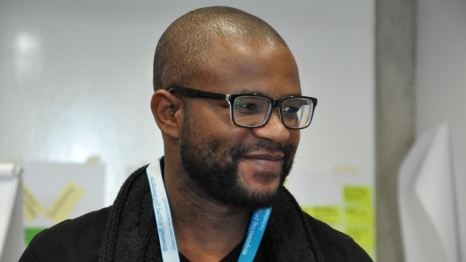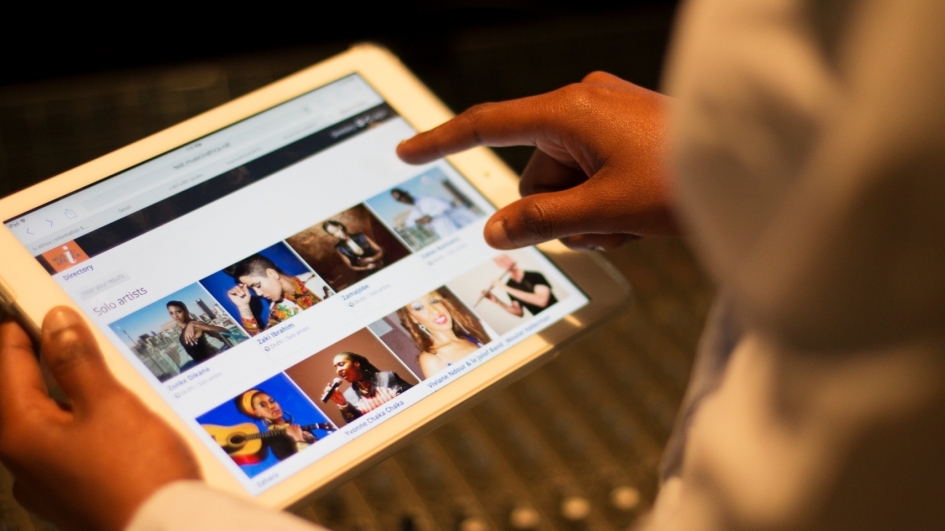
»We are serving as the information desk for Africa in a musical perspective.«
A guide to Africa’s music
Since its launch in 2013, the information and exchange portal Music In Africa has grown very fast, reaching millions of people every year. As a non-profit initiative, it serves as a guide for interested persons and contributes to creating greater global awareness of Africa’s music scenes as well as to improving the collaboration between artists at the international level. Zimbabwean culture manager and music producer Eddie Hatitye is Director of the initiative. In this interview he talks on his experiences, the first milestones, and his dreams for the future.
Eddie, Music In Africa is possibly the strongest music network in Africa. Is that something you could have imagined five years ago?
Yes, actually! It was very clear when we started that many people had been waiting for this kind of initiative in the music sector. Look at Africa: there are more than one billion people with extremely diverse musical backgrounds. Bringing these sectors together on one portal has never been tried before. Our growth stems on consistent effort and investment that has gone into the platform over the years and it is great to see our target groups responding positively.

What can be found on the website so far?
Our main content sections include the Artist & Industry section where you can find and connect with thousands of professionals who operate in the sector, musicians, funders, record labels, managers, and publishers; a Magazine section (featuring news, overviews of African music scenes, articles, reviews, and gig guides); a Knowledge section (with practical tools for music professionals) and an Education section offering quality tutorials and other educational content. We recently introduced music streaming which is achieved using very clever technologies: we do not host any music on our servers but we have managed to develop tools that allow musicians to sync their music from existing legal platforms and users are able to stream audio and video seamlessly. In addition to the comprehensive knowledge accessible for free on the portal, Music In Africa is becoming more of a tool for African musicians to promote their careers and connect with new fans. Over the years our strategy has also grown to include complementary offline projects like training, mobility funding, and conferences.
Isn’t this information already available anywhere else?
Yes and no. You can find a lot of information on African music online but most of it isn’t accurate. With the portal we are changing this. Every detail on our website is checked before publishing and we work with experts in the fields we are focusing on. We continue to invest more into experienced researchers and writers and this is paying off quite nicely as is evident on the quality of information you can find on the portal. To give you an idea: If you are travelling to a foreign country, you go to the information desk first and ask for a map, you ask for suggestions and want to know everything about the different areas and their special characteristics. In that sense, we are serving as the information desk for Africa in a musical perspective.
Who is producing all the content?
We have an in-house team with editors in Southern-, Eastern-, Western- and Central Africa. In addition to that, we commission knowledgeable people – researchers, music educators, and journalists to contribute. What has been exciting over the years is that user-generated content has increased significantly as artists see real value in adding their content on the portal. We have 18,000 profiles of musicians and over 50,000 accounts belonging to music fans. There are over 200,000 songs to listen to and added by the artists themselves.
That’s an interesting approach to involve the community. What role does technology play in this context?
There are two aspects: From a developmental perspective it was important to create a platform which suits the very diverse, and at times challenging, African market. Internet connectivity and accessibility remains problematic, for instance not everyone in Africa has a smart phone. But obviously when it comes to music in particular, there is another, a lot more important aspect: All over the world the internet and technology are becoming more and more influential in music. And there have been a lot of discussions whether that is good or bad. I think, generally many musicians might say: “we wish at some point that the internet never existed”, because it has changed completely how music is consumed. It has groomed a new kind of musician. But this is exactly why we need this kind of platform, to promote musicians, to reach out to new fans, to build new audiences, and be part of sustainable networks. The money now is in events, live performances and all these kind of things – however, without awareness people will never go to your show. Technology is will always be evolving. We aim to make the best out of it.
That means technology changed musicians’ attitude?
I have not met a single musician who wasn’t thinking about ways to exploit available technologies. Technology has certainly changed musicians’ attitude. Music In Africa is just one of the many great tools available for musicians today and I am pleased that musicians are starting to understand the need to build strong online identities. And it’s not just about the music, but also the content and context around it. We are playing an important role in supporting African musicians to achieve this and I think there is even more change ahead of us.
Creating an online portal is one thing but building a community the other. How did you manage to spread the word?
The beginning was a little difficult but we are at another stage now where we generally find more people wanting to work with us and sending us proposals every day. But it is worth noting that in its structure, Music In Africa was developed in a very inclusive and consultative way. We had over 200 music professionals from across the globe making contributions in various ways and most of these people are still very loyal to the initiative. To date we have over 45 key partners across the world, including media houses, festivals, associations, NGOs, record labels and many other. This gives us more perspectives and exposure. We now have over 25,000 people in our mailing list and very strong social pages amounting to hundred thousands of followers.
What are you focusing on most at the moment?
Our strategic plan for the next five years is to increase reach of our work, by extending our research into all the African countries. This should be completed by 2022. We are also planning to open our first office in Northern Africa, in Morocco this year. More importantly, we are expanding our offline programs, with the introduction of a pan-African music mobility program and an Instrument Building And Repair program. Our pan-African conference ACCES will happen in Ghana this year. These programs are in line with our strategy to diversify our funding base and be more self-sustaining. And as you can imagine, there is room for improvement with the portal and all our work in general. The music industry in Africa is moving up swiftly and that means we have to constantly keep updating our functionalities and content strategies.
What is your wish for the future of the portal?
Music In Africa should be the first port of call for all inquiries related to music in Africa. It should also grow beyond this to a level where it’s not just a portal, but a sustainable contributor to the African creative economy with a strong B2B aspect.
Thank you, Eddie! We wish you and the whole Music In Africa platform all the best.
April 2019


